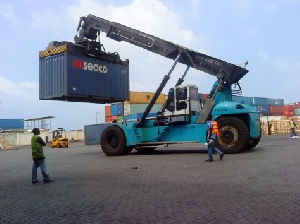Efforts by tax authorities to generate more revenue for the country are being thwarted by some shippers who are abusing the transit regime to avoid paying taxes and other charges on goods brought into the country.
The transit regime allows for landlocked countries within the sub-region to import goods through Ghana’s seaports without paying import taxes on them.
‘These imported goods are normally covered by a security or bond, and tracked by satellite or electronically monitored or by human escort.’
However, due to the dangers involved in using the human escort, monitoring of such goods or cargo is largely limited to electronic monitoring -- making it susceptible to all manner of fraudulent tactics employed by some local importers to manipulate the system.
Some local importers, according to officials of the Customs Excise and Preventive Service (CEPS) of the Ghana Revenue Authority, in attempts to circumvent the state declare their cargos shipped into the country as ‘goods in transit’ and along the way employ deceitful methods to keep the goods within the country.
The modus operandi of these ‘nation-wreckers’ has been discovered to be that they manage through some techniques to detach tracking devices attached to the cargos which enable Customs officials to monitor the goods destined for other countries, and then send them into the domestic market.
This, according to Kofi Toffah, Assistant Commissioner and Sector Commander of CEPS in the Ashanti Region, is causing the state to lose huge sums of revenue which otherwise could have gone into developmental projects.
He said the situation is a major concern to the Customs Excise and Preventive Service (CEPS), which is mandated by the state to ‘collect indirect taxes, protect revenue through the prevention of smuggling and others; and also as a frontline institution to surmount external aggression and protect the territorial integrity of the country’.
The Sector Commander said this to B&FT in an interview during a one-day stakeholder engagement seminar organised by the Ghana Revenue Authority to sensitise the media on Customs procedures.
Officials of CEPS have also called on the media to partner the revenue authority to educate the public on the negative effects of these fraudulent acts on the economy.
‘We need enough revenue to be able to undertake developmental projects and others, so if people shortchange the state how is it possible for activities to be carried out?” he asked rhetorically.
He also said that his outfit is putting in every effort so as to ensure they exceed the revenue target for the year.
The Ghana Revenue Authority failed to meet its revenue target of about GH?15.6billion for the previous year, 2013, collecting about GH?12.9billion -- indicating a shortfall of its target by 17%. The Authority however noted that the figure collected was about 14 percent above that of the GH?11.7billion realised in 2012.
Officials of the GRA say they remain resolute in their effort to generate more revenue for the state, but this however requires cooperation from citizens of the state.
The Customs, Excise and Preventive Service indicated that it is also challenged in its operations, particularly in the areas of staff strength, logistics among others.
It was revealed that there had not been any recruitment of personnel for CEPS for the past seven years until January 2014, when about 110 new recruits were selected to undergo 18 months of training before qualifying to join CEPS.
Presently, the total personnel of Customs is quoted as about 3,400 -- being part of the total 7,000 workforce of the Ghana Revenue Authority which includes Customs Division, Domestic Tax Revenue Division, and Support Services Division.
Business News of Monday, 27 October 2014
Source: B&FT

















